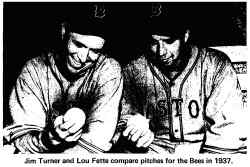
| Turner and Fette-Unlikely Rookie Phenoms |
 |
 |
|
Although the Boston Bees were a weak-hitting second division ball club going nowhere, they caused some surprise around the National League in 1937 when they came North with a pair of "aged" rookie pitchers on their roster, Jim Turner, 32 and Lou Fette, 30. Turner, from Nolesville, Tennessee, toiled for four years in the Piedmont League, for three years in the Pacific Coast League and played four years with Indianapolis in the American Association without impressing big league scouts. On his 32nd birthday, August 6, 1936, however, he shut out the Minneapolis Millers as a Boston Bees scout watched from the grandstand. With a "what have we got to lose" attitude, the Bees acquired the righthanded hurler. Turner, who worked in the off-season as a milkman, barely made the team in spring training in 1937. A spot on the roster opened up for him when another pitcher became homesick and was sent home. Fette, a strapping 200-pounder from Alma, Missouri, began his minor league career as a 20-game winner with Pueblo in 1928 but had few winning seasons thereafter. He labored in the American Association for eight years, first with Kansas City and then St. Paul, before attracting the attention of the Bees by winning 25 games with the Twin City club in 1936. Neither Turner nor Fette were overpowering pitchers. They fanned few batters but each had a good curve ball and control. Nevertheless, it came as a stunning surprise to see both hurlers win 20 games for the fifth place Braves. Only two other hurlers won that many and they pitched for the pennant-winning New York Giants. Carl Hubbell won 22 and Cliff Melton 20. The latter was also a rookie, giving the National League a remarkable first-year pitching staff in 1937. Turner, who compiled a 20-1 1 won-lost record, led the league with a sparkling 2.38 earned run average and 24 complete games. Fette posted a 20-10 log, had 23 complete games, and tied Turner and Lee Grissom with five shutouts. One was a 1-0 whitewashing of the Phillies in 13 innings. Deacon Danny MacFayden also pitched well for the Bees, compiling a 2.93 ERA while winning 14 and losing 14. Veteran Guy Bush had a poor season with 8 and 15. Only two Boston hurlers had won 20 games in the previous 20 years-Joe Oeschger in 1921 and Ben Cantwell in 1933-so the double dividend from Turner and Fette was much appreciated by manager Bill McKecknie. On the other hand, the Bees finished last in batting with a team average of .247. While Joe Medwick was hitting .374, Johnny Mize .364, and Gabby Hartnett and Paul Waner .354, the Bees had to rely on Gene Moore with a .283 mark and Tony Cuccinello with .271. Rookie Vince DiMaggio batted .256. Catcher Al Lopez hit only .204, but he did a marvelous job with the rookie pitchers. Fette won only 11 games in 1938 and 10 in 1939 when he led the NL with six shutouts. He pitched two scoreless innings in the 1939 All-Star game, but later that season hurt his arm. He didn't win a game after that. After an absence of several years he came back to hurl in five games for the Boston NL club in 1945. Turner also wasn't able to match his initial major league season, but he did stay around longer than Fette. He was 14-18 in 1938 and 14-7 with Cincinnati in 1940, and pitched relief for the Yankees during the War years. He played in two World Series, with the Reds in 1940 and the Yankees in 1942. He later coached for 23 years with those two clubs. Considering what took place in their careers before 1937 and what took place after 1937, that one season certainly stood out as the high point for these two rookie phenoms. |

 Turner & Fette
Turner & Fette